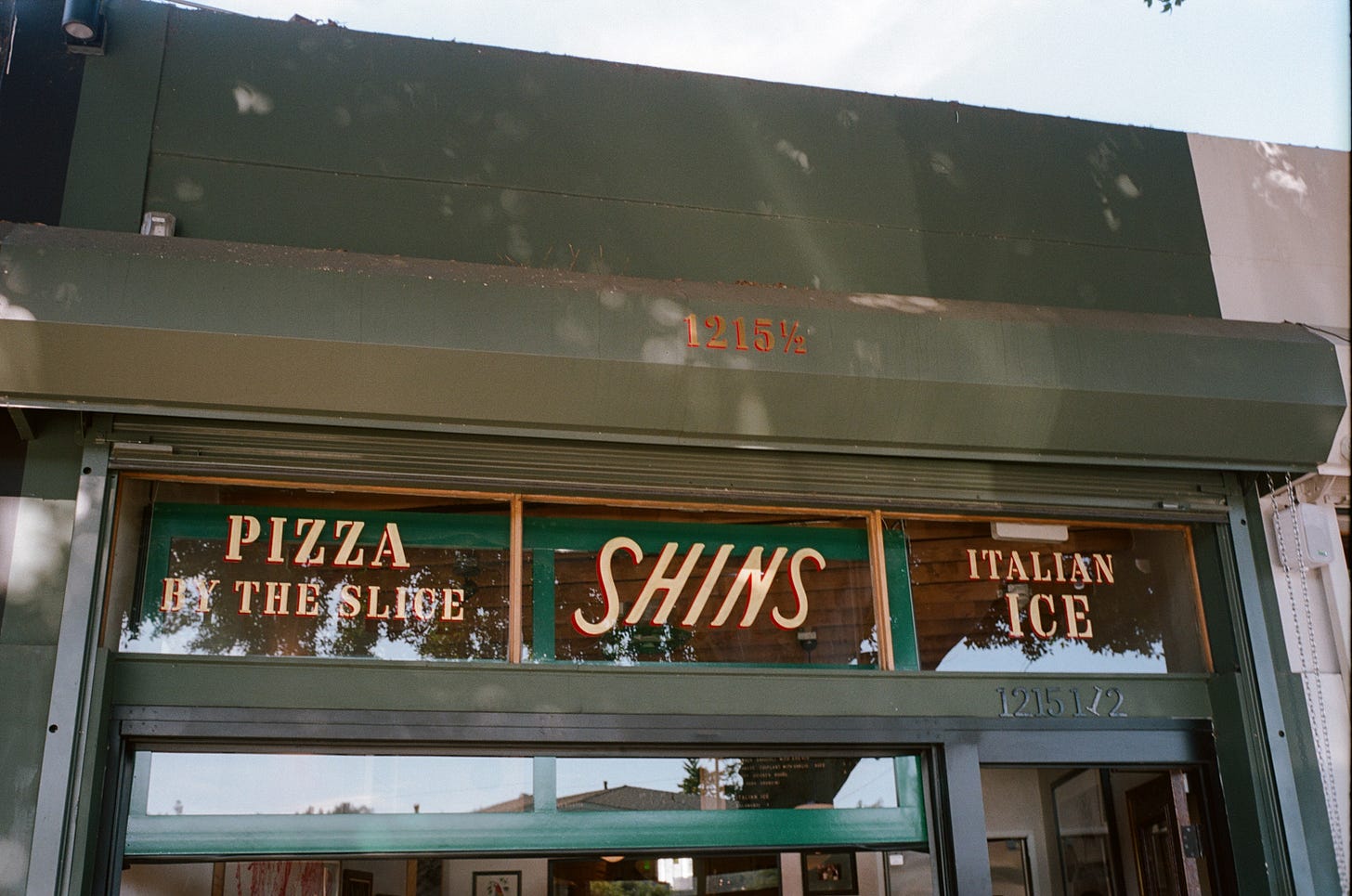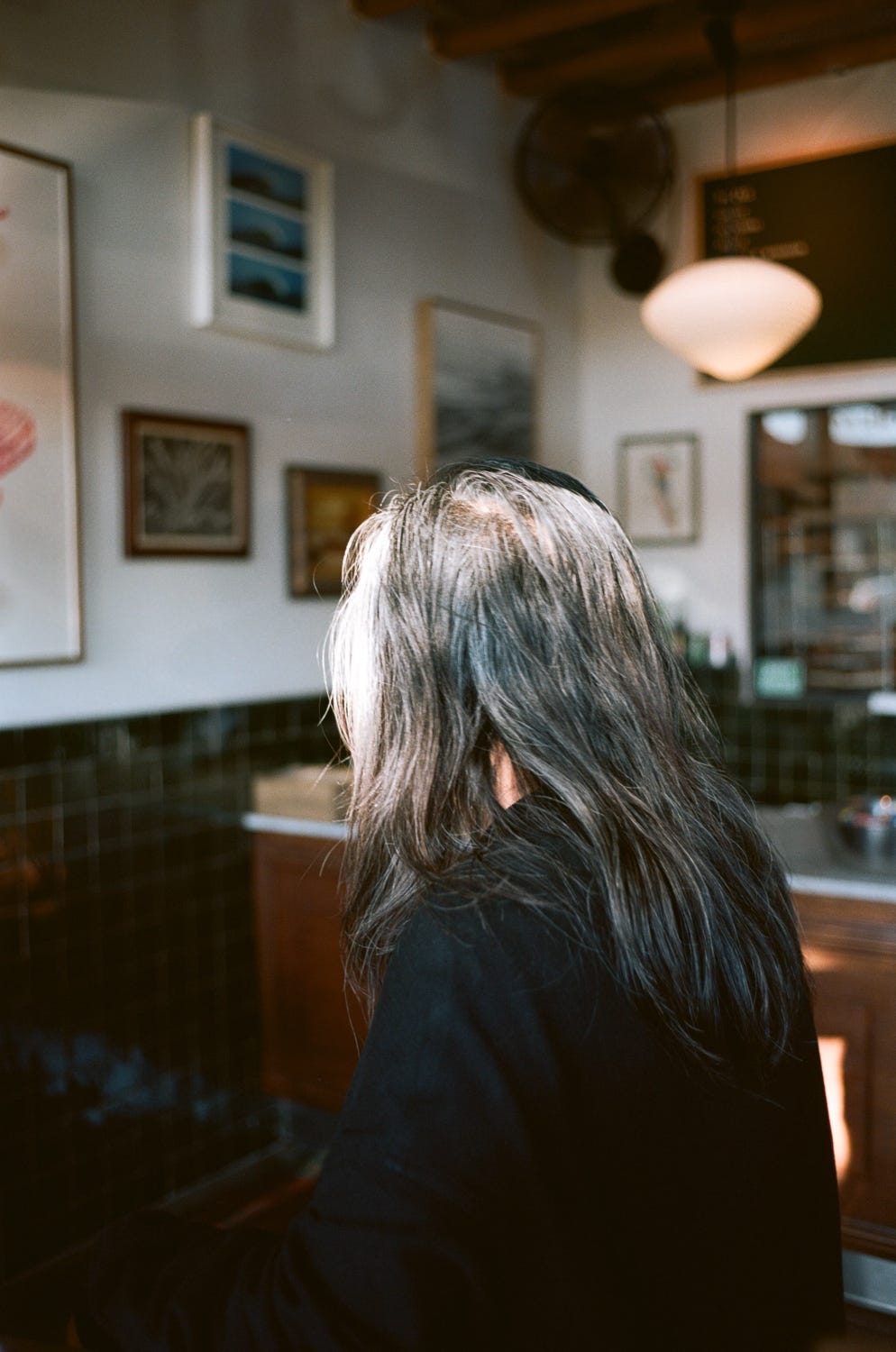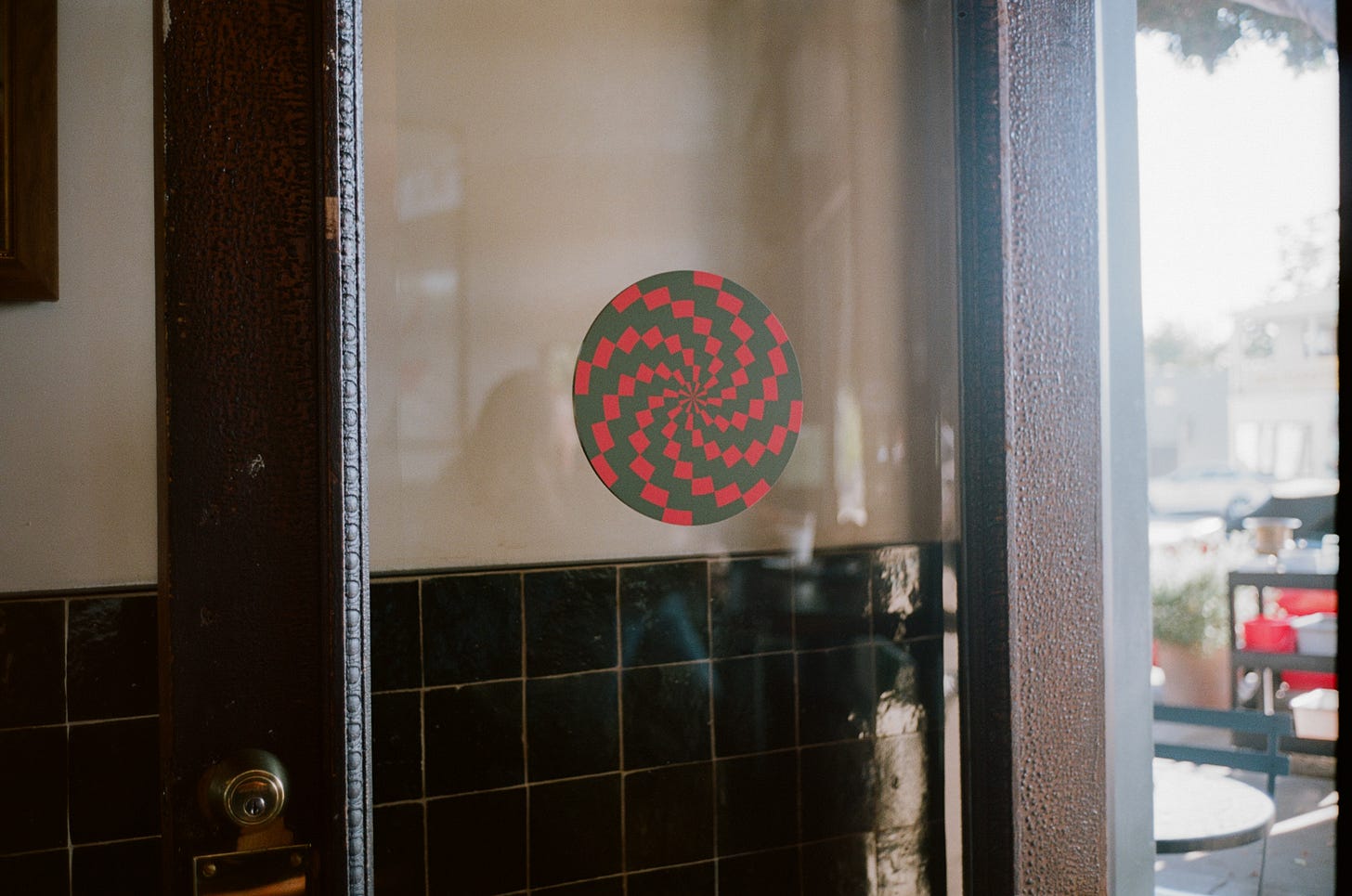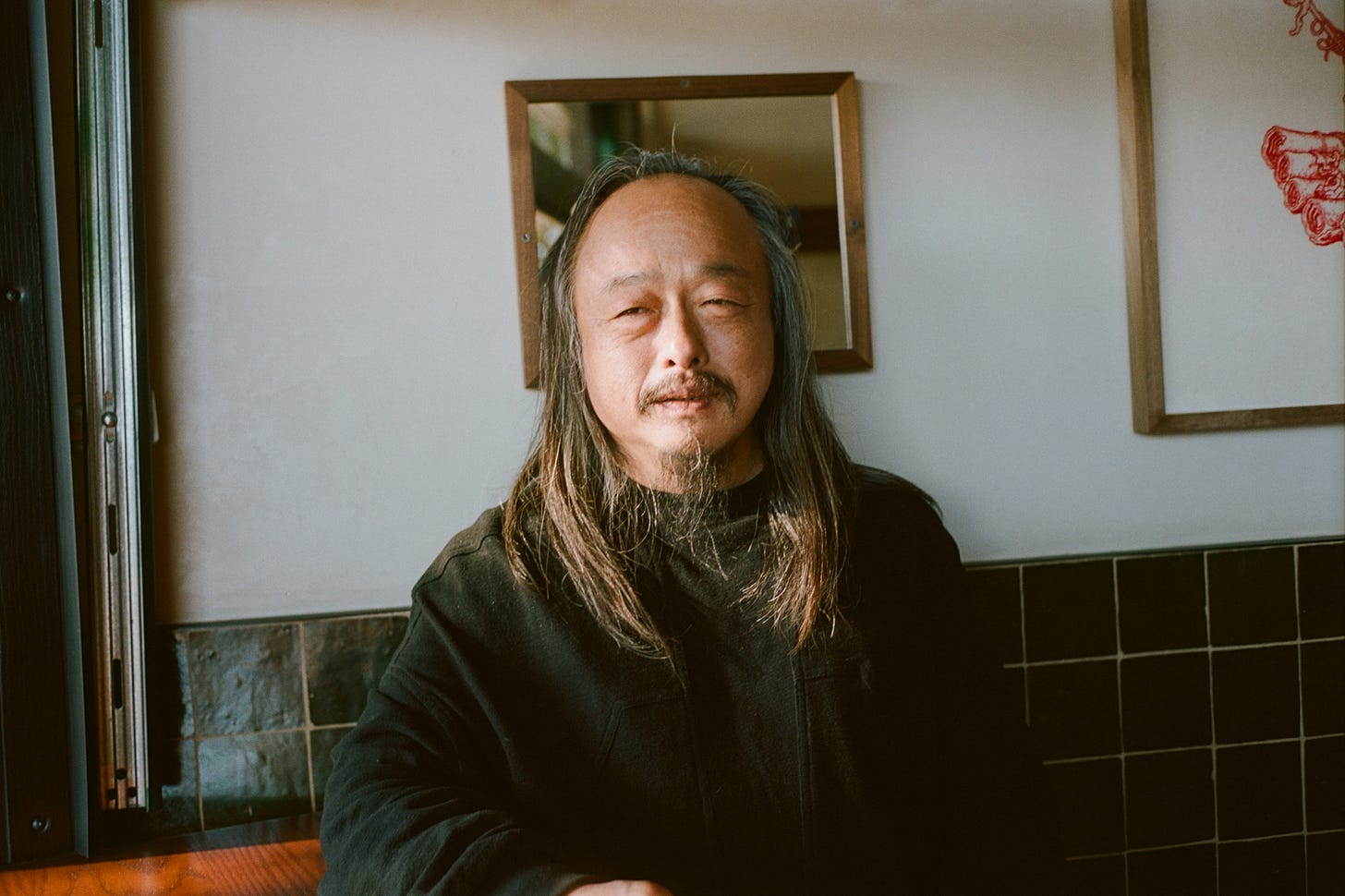At Shins Pizza, Shin Irvin Takes Center Stage
How the creative director behind Gjelina, Yangban, and Mizlala built the look and feel of his namesake pizzeria in Cypress Park.
Normally, The Angel stories are published on Wednesdays, but I had a technical difficulty yesterday, so here is your rare Thursday post.
Photographs by David Gurzhiev
Many of you have been, or at least have been meaning to go, to Shins Pizza. Since August, the slice shop has been serving pizza, seasonal sides, calamansi Italian ice, and Dr. Brown's Cel-Ray soda to residents of Cypress Park and those looking for a fix of East Coast-style grub. For former New Yorkers especially, the arrival of Shins has been much to talk about. “Finally! Somewhere to get a slice.” “But how does it compare?” “How late does it stay open?” (The answer is 10 p.m.) Etcetera.
Many of you are aware, also, that Shins shares a chef-partner with its next-door neighbor, the appropriately popular Portuguese restaurant Barras Santos, helmed by Melissa López—who beforehand cooked at Bestia and in New York City at Barbuto. (Here’s an easy one-to-the-other date night: put your name on the waitlist for dinner at Barras Santos, then share a Shins’ pepperoni slice to whet your appetites.)
What many of you do not know is that the Shin behind Shins is Shin Irvin, an influential player in the Los Angeles restaurant world who, until now, has remained behind the scenes. As the founder of the creative agency folklor, he is responsible for the look and feel of many heavy-hitting restaurants, including the recent redesign of the modern Korean-American destination Yangban and, most notably, the pioneering Venice institution that is Gjelina. Today, Gjelina is a household name for any Angeleno at least somewhat interested in restaurants, but when it opened in 2008, it was Irvin’s job to help diners pronounce it. His solution for the logo was to color the silent “G” in blood orange while the rest of the name is black. For over 15 years, Irvin has played an instrumental role in building a host of hospitality brands in Los Angeles—from determining the typeface of fast-casual Israeli minichain Mizlala to designing merch for the burger joint The Win-Dow—but only recently, as the proprietor of his namesake pizzeria, is he in the spotlight.
On a recent afternoon, I met Irvin at Shins, where he was camping out in the corner of the pizzeria’s red oak standing counter, eating a sausage and mushroom slice. It’s the newest pie on the menu and, as of late, his regular order: a light, thin, yet still stiff and foldable crust topped with tomato sauce, mozzarella, crumbles of housemade pork-and-fennel sausage, cremini mushrooms, and scallions. As is the case with some of Shins’ other items, like the miso-dressed cucumber and Asian pear salad and ginger-marinated crispy chicken nuggets with kimchi mayo, the slice has a slightly Asian bent, as a nod to Irvin’s heritage.
Irvin was born in South Korea, abandoned shortly after, and then taken in by the Shin family until he was adopted at the age of seven by Donna Jean Irvin, who lived in Philadelphia. His late mother named him David, but after she passed away in 2020, he started going by Shin. Irvin, who has grey hair that stretches past his shoulders and a long goatee, says people were always surprised when he said his name was David Irvin. Shin Irvin felt more fitting. Like the pizzeria, the name change was a way for him to honor both of the families that raised him. Behind the counter at Shins, there are framed photographs of Irvin as a kid with his mother and grandmother in Philadelphia. “They kind of hold it down,” he says. “Most pizzerias do that, they have [pictures of] their family.”
A few years ago, Irvin met the co-founder of Last Word Hospitality (Found Oyster, Nossa Caipirinha Bar, Barras Santos), Adam Weisblatt, and the two of them became fast friends. They were in talks to open a bar together until the pandemic started, and then the topic of pizza came up. “I had this idea to open a pizza shop inspired by my Friday night pizza ritual with my mom,” Irvin says. Growing up in Philadelphia, he frequented a Greek-owned slice shop called Paul’s, which served pizza that was similar to what you’d find at most shops in New York but was called Greek-style. What that means exactly, Irvin doesn’t know. “Everything with more feeling, I guess,” he jokes. “You’d go in there, and Paul would know you and keep you in check. We used to hang out there and play video games.”
Shins is dedicated to the Shins and the Irvins, informed by the now-closed Paul’s, and fashioned with Irvin's design sensibility. Irvin spent the first decade of his career in New York City, where, as he points out, “most slice shops are kind of depressing.” They have fluorescent lighting and an archetypal aesthetic because they’re functional more than anything else. In the population-dense East Coast-style city, counter-service pizzerias are meant for people to grab a slice and be on their way. Shins, on the other hand, is an elegant shop on a rare tree-lined commercial street in L.A. decked out in forest green tiles, hand-painted signage, and a warm red oak countertop that, along with a large glass sliding window, divides the inside of the pizzeria from the sidewalk. Art from friends of Irvin’s, or found by Irvin, adorns the walls, including a large red ink drawing of Chinese cormorant fishermen by James Jean, a Ricky Lee Gordon charcoal painting of waves, and a cross-stitching of a parrot.
On the sidewalk outside the shop, a pile of green crates is for customers to disassemble and create makeshift seats for enjoying a slice or two, a Diet Coke, and perhaps a side of Japanese eggplant with peppers and garlic sauce. Irvin recycled the idea from Gjelina Takeaway, which provides old milk crates in the alleyway next to the Abbott Kinney storefront for people to squat on. They’re green because he “loves green,” a sentiment that is reflected throughout the pizzeria, from the paint on the exterior walls to the drink selection, which includes green cans of Vernor’s ginger soda in addition to the green glass bottles of Cel-Ray. Shins’ secondary color is red, showcased in a smattering of street-facing tiles, vats of tomato sauce in the open kitchen, and Shins’ logo—a green-and-red checkered circular swirl. “In Asian culture, especially Japanese culture, they have little seals that mark families, like samurai clans, and this logo feels like that,” Irvin says. “I thought pizza and Italian ice are both kind of swirly, so let’s make a family crest.”
Three months in, Shins Pizza is settled into Cypress Park but ever-evolving, with seasonal menu changes and additions to the art gallery walls. With some brand recognition underway, merch is up next. Irvin knows a thing or two about that.









